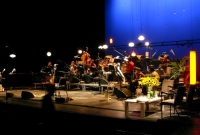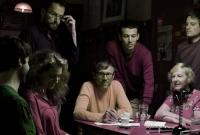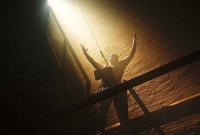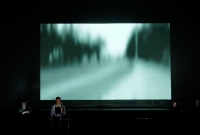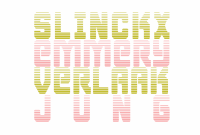De Standaard, May 6th 2003, Maarten Beirens, **WAITS / WEILL,
(...) the Kurt Weill/Tom waits concert by Ictus was plain delirious. The combination of Weill and Waits may on paper seem absurd, but anyone who knows Waits’ music quite well will know how closely their spirit comes to Weill’s cabaret-like songs. The new arrangements (by François Deppe, Jean-Luc Fafchamps and Fabian Fiorini) respected the anarchist nature of Waits’ songs and Weill’s acerbic tone. But the real challenge lay in the vocals, with the singer Maria Husmann proving to be a phenomenal Weill interpreter. Her broad expressive palette, ranging from sustained high notes to wry parlando, gave even the best-known Weill numbers such as Surabaya Johnny and, especially, Seeräuber-Jenny an amazingly powerful impact.
The rock singer Kris Dane had the thankless task of making us forget Tom Waits’ sandpaper timbre and inimitable idiom in songs from Frank’s Wild Years and The Black Rider. He succeeded pretty well, sometimes assisted by the device of singing in a microphone and a megaphone simultaneously. It gave his voice the necessary sharp edge.
Backed by an unfettered Ictus Ensemble, Dane performed these numbers in a way that Waits would undoubtedly have approved. In my opinion, Dane’s version of I’ll Shoot the Moon even surpassed the original.
One nevertheless senses a difference from Husmann, who is clearly used to singing with a large ensemble. Ictus was over the moon in the carnival-like lunacy of the whole programme, even though true emotion was thereby quickly smothered by ironic overacting, as in Waits’ The Briar and the Rose. The theatrical capers of the band-leader Fabian Fiorini soon began to irritate too. On the other hand it was of course the most chaotic moments that suddenly took on an added dimension: Weill’s Alabama Song and Waits’ Innocent When You Dream.
Isabella Maria, Il Giornale della Musica, Italy, September 2005
Waits-Weill in Torino
Rather than a concert-cum-spectacle, what the Belgian group Ictus Ensemble brought to Turin yesterday evening for Settembre Musica was a piece of chamber music for two voices and small orchestra; the songs of Kurt Weill (including 'Dreigroschenoper', 'Happy End', and 'Aufstieg & Fall der Stadt Mahagonny') go well with those of Tom Waits (also taken from two works written for theatre, 'Frank's Wild Years' and 'The Black Rider') in a play of cross-references and contrasts that give life to a narrative, rather than a dramaturgical, idea.
This narrative is similar to the 'narrated theatre' of some of Schubert's lieder cycles. Despite the distance that separates them in terms of time, space, and the starting point of their work, seen from this angle Weill and Waits end up calling at the same port. The frozen emotivity of one pairs up with the alienated and alienating hyper-sentimentalism of the other; their humanity is the same ethereal humanity, sad and distorted with rage or wine (or love, on occasion), which contemplates piratical vendettas and in the meantime is content with shooting at the sky. The arrangements created for the occasion by three composers (Francois Deppe, Jean-Luc Fafchamps, and Fabian Fiorini on stage in the capacity of acrobatic director) help provide uniformity to the sound matter, which makes use of the contrast between the voice of rock singer Kris Dane (often distorted and made to sound hoarse, more to bring to mind rather than imitate Waits's original timbre) and that of soprano Judith Vindevogel, who frees Weill from the cabaret-style interpretations that over time have settled on his music.
It is an exhibition of human oddities, as stated in the initial text: the monkey-woman, the boy-dog, the three-headed baby and the man born without a body. It is of little importance that the deformities, as the songs unfold, affect the soul more than the body – to the extent that the last song 'My Ship', which Weill wrote in America (on a text by Ira Gershwin) for his 'Lady in the Dark', sounds both like an achievement and a regret, a sonata theme that finally returns after precipitous developments, or perhaps an equally lacerating, and a little more acid, 'Doppelgänger'.
Res Musica, Joelle Farenc, December 2008
Waits-Weill in Dijon
Cocasse ou tragique ? Ironique ou engagé ? Rock ou chanson ? Musique ou théâtre ? En fait, tout. Oui, c’est tout cela à la fois et bien plus encore que nous offre la quinzaine d’artistes qui ont concocté ce spectacle. Ils ont eu l’excellente idée de réunir les chansons de deux auteurs d’exception, que l’on peut étiqueter comme marginaux : l’un, Tom Waits, le californien, auteur, acteur, compositeur et interprète, au talent dérangeant et provocateur, cultivant avec maestria la marginalité et recherchant la poésie dans l’absurde, l’autre d’origine allemande mais bien aimé de l’Amérique, Kurt Weill, le sentimental révolté. Le répertoire est donc principalement bilingue, et totalement assumé comme tel.
(...)
L’ensemble instrumental Ictus fait partie intégrante du spectacle qu’il ne fait pas qu’accompagner : il y ajoute une dimension ironique avec souvent un doigt de poésie, et il revisite aussi les répertoires abordés par les chanteurs grâce à une orchestration fine et spirituelle, pleine d’autodérision. Pour prolonger l’atmosphère de My Ship, des sonorités « naturelles » évoquent le départ d’un transatlantique et les cris des mouettes. Pour accompagner Barbara’s Song, il y a bien sûr un talentueux piano obligé, mais on inclut aussi des sonorités étranges. La poésie du texte de la Complainte de la Seine est simplement renforcée par l’emploi de trois instruments à vent à la sonorité veloutée et délicate. Comme l’aurait sans doute souhaité Tom Waits, l’emploi de percussions inattendues apporte souvent de la fantaisie et de l’ironie. Enfin des instrumentistes en pleine possession de leur technique, comme le trombone et la guitare, n’hésitent pas à se lancer dans des solos déjantés. La direction de Fabian Fiorini, vêtu façon « artiste » des années 70, introduit aussi une note de gaîté et de bizarrerie.
La conduite du spectacle obéit finalement à une certaine progression logique : l’énergie débordante, souvent agressive et pleine de noirceur « gothique », du début de la soirée fait place petit à petit à une poésie nocturne, celle d’un monde de fantômes bien anglo-saxons, le monde des rêves à la lueur de la lune.
Joelle Farenc
